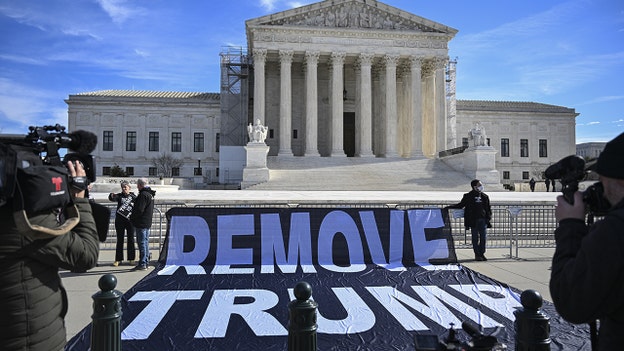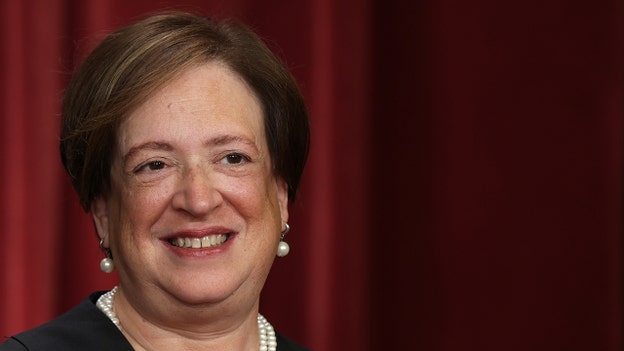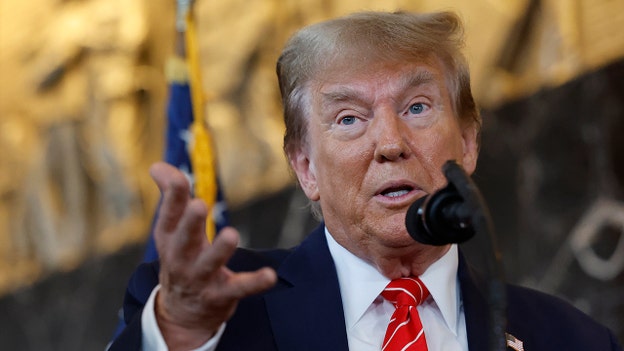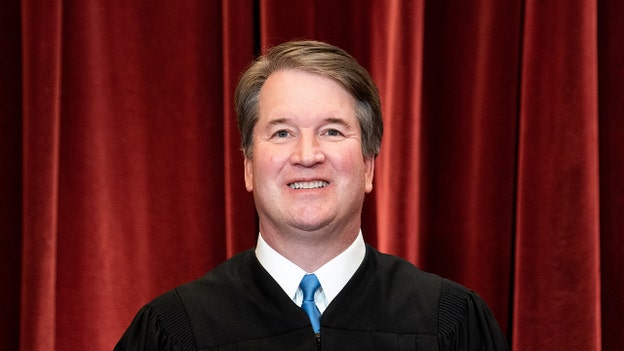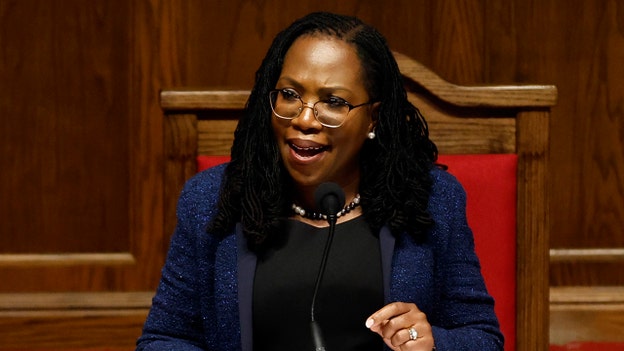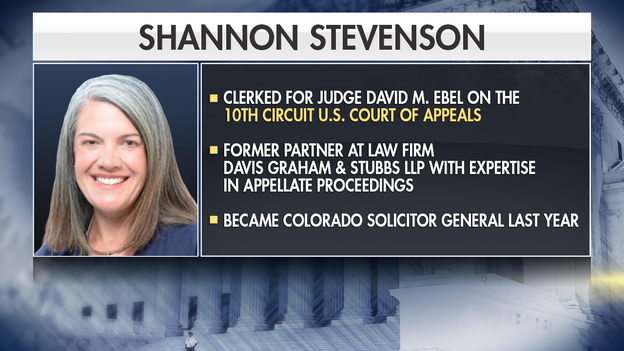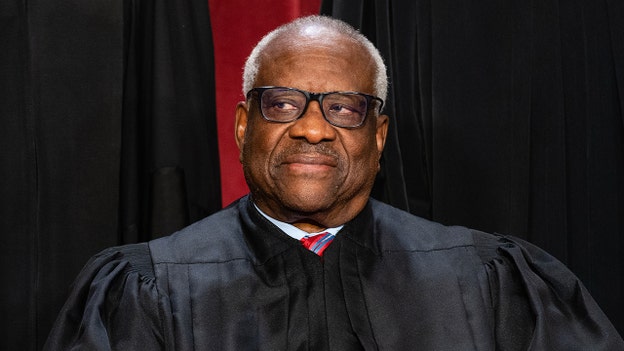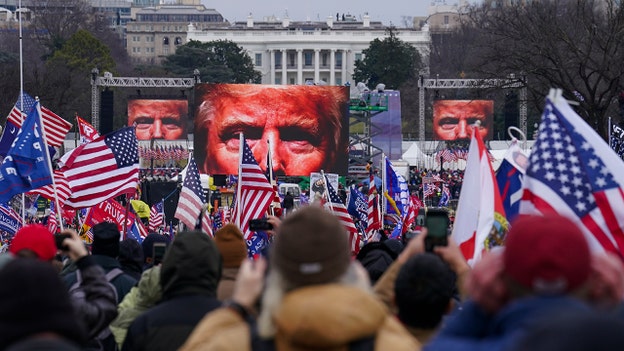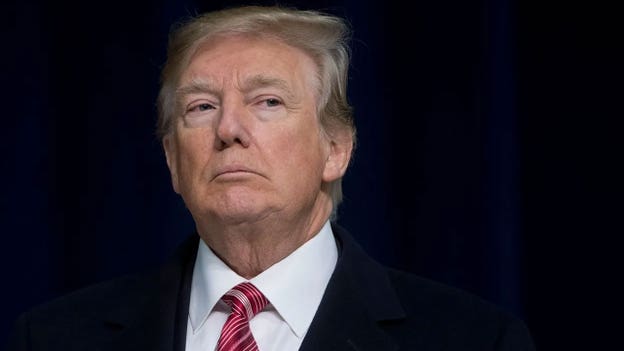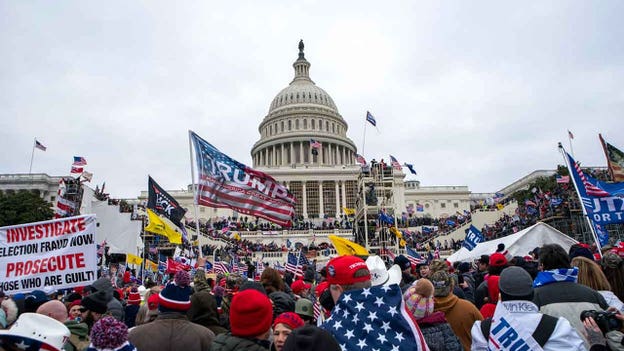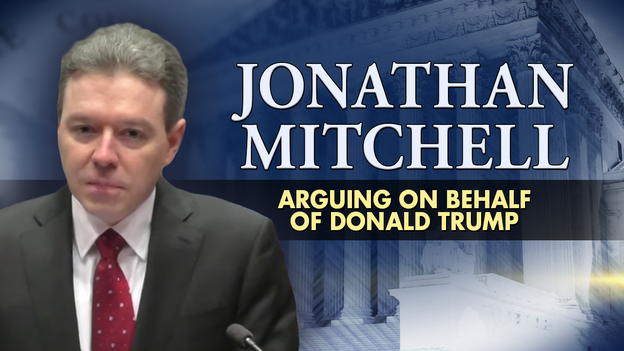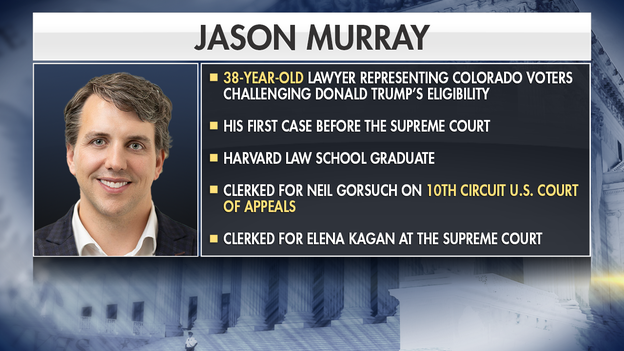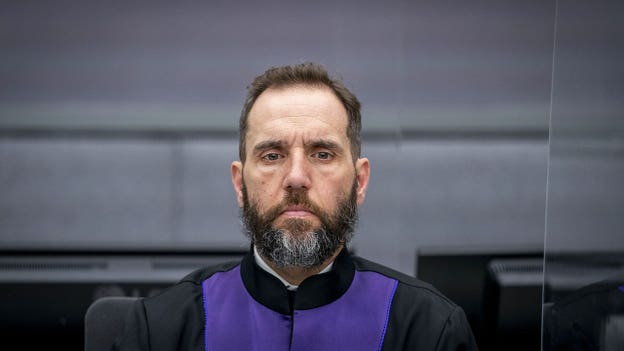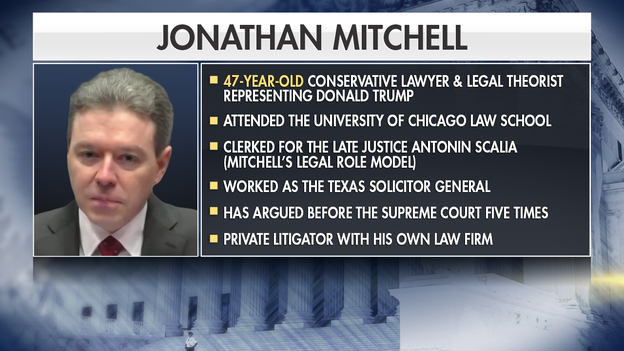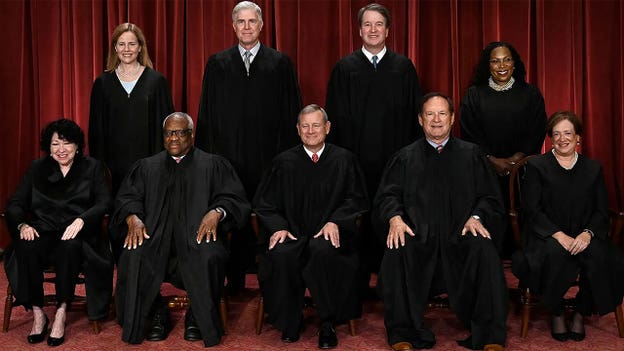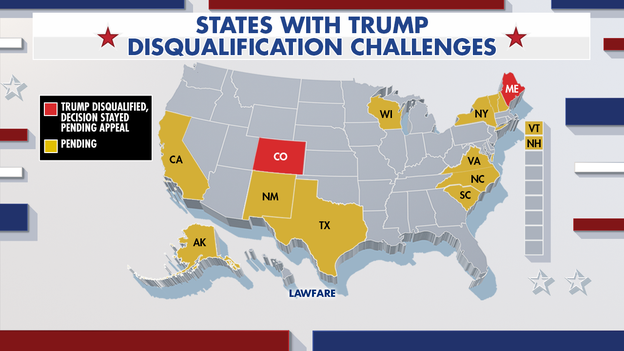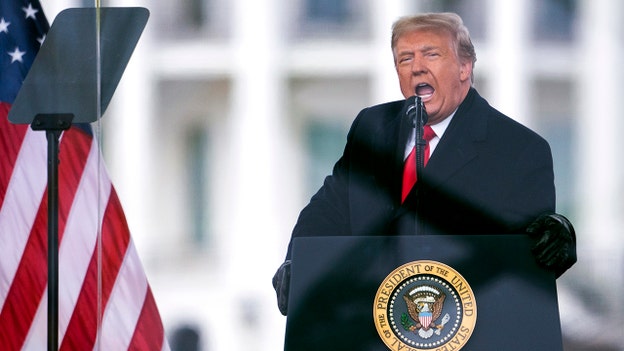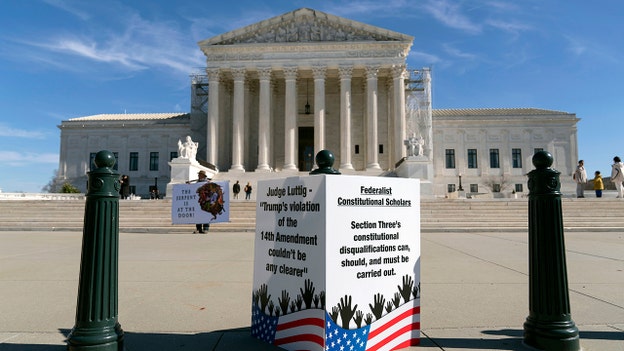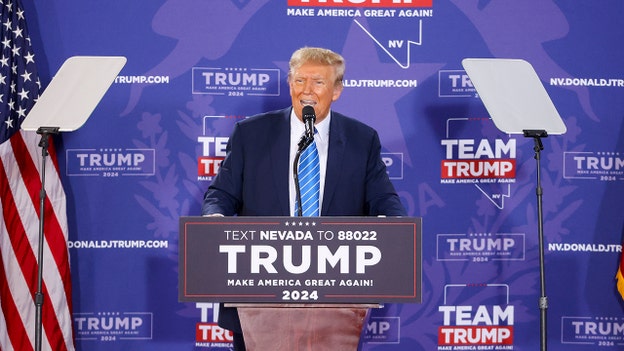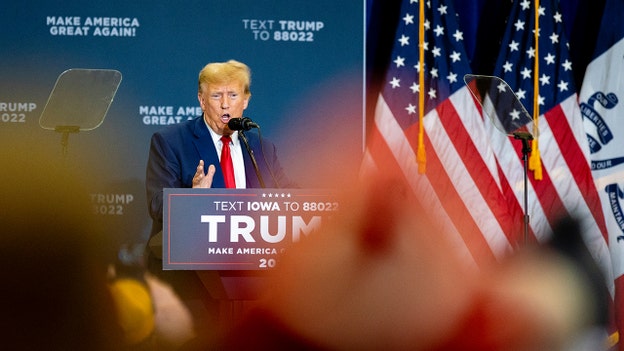SCOTUS hears Trump ballot oral arguments, justices appear skeptical of removal
The U.S. Supreme Court heard oral arguments Thursday, Feb. 8, 2024 on whether former President Donald Trump should be removed from Colorado's primary ballot under the 14th Amendment for "insurrection" by inciting the Jan. 6, 2021 Capitol riot.
Coverage for this event has ended.
Supreme Court justices who heard arguments Thursday on whether Donald Trump should be kicked off the 2024 Colorado ballot appeared to be “leaning in favor” of the former president, according to Fox News legal correspondent Shannon Bream.
Justice Kagan questioned whether one state should decide on behalf of the entire country who should be president.
Justice Roberts warned that if the Court ruled in favor of the plaintiffs, some states would interpret that to mean they could kick off Democrats or Republicans from the ballot.
Justice Jackson challenged lawyer Jason Murray’s assertion that there was no ambiguity in Section 3 of the 14th Amendment.
Chief Justice Roberts warned of the “daunting consequences” should only a handful of states decide the President of the United States.
Per Bream, a closed-door conference vote on the decision will come in the next few days. A decision may come in a matter of days or months.
The White House was careful on Thursday not to weigh in on arguments brought to the Supreme Court on whether Donald Trump should be kicked off the 2024 Colorado ballot.
“So, I'm going to be really careful. Obviously, it's an ongoing legal case,” White House Press Secretary Karine Jean-Pierre said when asked how closely President Biden was following.
“I can't comment on the ongoing legal case. As it relates to your question about the president. He's been busy all day, obviously delivering and working on the business for the American people. I just don't have anything on his cable-watching schedule today.”
The justices heard more than two hours of arguments in their first case considering Section 3 of the 14th Amendment. A fast-tracked decision is expected in the coming days or weeks.
Fox News contributor Jonathan Turley reacted to Thursday's oral arguments at the Supreme Court on "Outnumbered," observing that things did not go well for the attorney representing Colorado voters.
"I think that the advocates for disqualification probably expected a cold reception, but this was perfectly glacial," Turley said. "The problem for Jason Murray is that his toughest questions came from the left of the court."
Turley observed that Justices Ketanji Brown Jackson and Elena Kagan, both Democratic appointees, posed some of the hardest questions to the attorneys who argued Trump should be removed from the ballot. He said Jackson's questions about Section 3 of the 14th Amendment were noteworthy because she kept asking if the presidency was covered by the text of the constitution.
And Chief Justice John Roberts, Turley mentioned, made an important point that the 14th Amendment was historically meant to take power away from the states, but Colorado's argument would expand state power over candidates for federal election.
"This was really a tough going. Jason Murray did as good a job as he could do, but I imagine he wanted to do everything short of pulling the fire alarm at one point," Turley said. "He was just getting hit from all sides in this argument."
A Supreme Court ruling on whether former President Donald Trump is eligible for the ballot in Colorado is expected within days or weeks, although there is no set deadline to decide.
Over more than two hours of oral argument, the majority of the court appeared skeptical of Colorado's decision to remove Trump from the Republican presidential primary ballot for "insurrection" related to the Jan. 6 riot at the U.S. Capitol.
The 14th Amendment, Section 3 of the Constitution states, "No person shall… hold any office… under the United States… who, having previously taken an oath, as a member of Congress, or as an officer of the United States… to support the Constitution of the United States, shall have engaged in insurrection or rebellion against the same, or given aid or comfort to the enemies thereof."
Colorado's highest court in December ruled that 14th Amendment clause covers Trump's conduct on January 6, 2021 and therefore does apply to a president, despite not explicitly indicated in the text. But that decision has been on pause pending the Supreme Court's ruling.
The state's 2024 presidential primary ballots with Trump's name on the Republican ballot has already been certified by the Colorado Secretary of State.
But if Trump is ultimately declared ineligible for public office before the state's March 5 primary, then any votes cast in his favor would be nullified.
Fox News' Shannon Bream and Bill Mears contributed to this update.
Justice Elena Kagan pressed the attorney for Colorado voters, Jason Murray, on why a single state should have the power to decide who gets to run for president.
“I think that the question that you have to confront is why a single state should decide who gets to be President of the United States," Kagan told Murray.
“Why should a single state have the ability to make this determination not only for their own citizens but also for the nation?" she asked, remarking that the question of Trump's role in the Jan. 6 riot "seems awfully national to me."
Murray argued that ultimately the Supreme Court will decide questions of federal constitutional eligibility and that each state would have to decide whether to put an ineligible candidate on the ballot.
But Justice Amy Coney Barrett was skeptical. "If we affirmed and we said he was ineligible to be president, yes, maybe some states would say, welp, you know, we're going to keep him on the ballot anyway. But really, it's going to have, as Justice Kagan said, the effect of Colorado deciding."
Former President Donald Trump said it was "unfortunate" his candidacy is being challenged in Colorado and other states after the Supreme Court concluded oral arguments.
"I just finished watching Supreme Court, you know, like to watch in many respects. It's unfortunate that we have to go through the thing like that," Trump told reporters at a press conference at Mar-a-Lago in Florida. "I consider it to be more election interference by the Democrats that's what they're doing. Good news is we're leading virtually every poll."
The high court heard arguments Thursday on whether Trump should be disqualified from the ballot in Colorado for inciting in an "insurrection" at his Jan. 6, 2021 rally at the Capitol.
Trump called the oral arguments a "beautiful process" and said, "I hope that democracy in this country will continue."
"You have millions of people that are out there wanting to vote and they happen to want to vote for me or the Republican Party, whatever you want or however you want to phrase it, But I'm the one running and we are leading in every poll," Trump said, calling the support he's received a "great honor."
Justice Brett Kavanaugh threw a series of questions at Colorado attorney Jason Murray in an attempt to nail down whether its the states or Congress that can ban insurrectionists from holding federal office.
"When you look at Section 3 the term insurrection jumps out," Kavanaugh said. "And the questions are, what does that mean? How do you define it? Who decides? Who decides whether someone engaged in it?"
Kavanaugh noted the courts looked at these questions in an 1869 decision, known as "Griffin's case," which found that an act of Congress was necessary to enforce the 14th Amendment's ban on insurrectionists holding federal office.
"These are difficult questions, and you look right at Section 5 of the 14th Amendment ... and that tells you Congress has the primary role here," Kavanaugh said. "I think what's different is the processes, the definition, who decides questions really jump out at you when you look at Section 3.
During oral arguments Thursday, Supreme Court Justice Ketanji Brown Jackson questioned why the president was not listed in Section 3 of the 14th Amendment.
"Why didn't they put the word president in the very enumerated list in Section 3?" Brown asked Colorado voters' lawyer Jason Murray. "The thing that really is troubling to me is I totally understand your argument, but they were listing people that were barred and president is not there. And so I guess that just makes me worry that maybe they weren't focusing on the president."
Murray responded with a reference to history.
"This came up in the debates in Congress over Section 3, where Robert Johnson said, 'Why haven't you included the president and vice president in the language?' And Sen. Murrell responds, 'We have. Look at the language "any office under the United States."'"
"Yes, but doesn't that at least suggest ambiguity?" Jackson responded.
The 14th Amendment, Section 3 of the Constitution states, "No person shall… hold any office… under the United States … who, having previously taken an oath, as a member of Congress, or as an officer of the United States… to support the Constitution of the United States, shall have engaged in insurrection or rebellion against the same, or given aid or comfort to the enemies thereof."
Shannon Stevenson is the Solicitor General at Colorado Attorney General Phil Weiser's office.
Stevenson appeared before the Supreme Court today for oral arguments in representation of Democratic Colorado Secretary of State Jena Griswold regarding the issue of former President Donald Trump's appearance on Colorado state ballots for the 2024 presidential election. This is her first time arguing in front of the U.S. Supreme Court.
She was previously a clerk for former Judge David M. Ebel of the United States Court of Appeals for the Tenth Circuit and earned her B.A. and J.D. degree from Duke University, according to biography on the AG's website.
SCOTUS justices granted time to be split between the six Republican and unaffiliated voters who filed against Trump and Stevenson. The voters were to be given 30 minutes for oral arguments and Stevenson was granted 10, though Supreme Court arguments are expected to extend beyond the allocated 80 minutes.
The U.S. Supreme Court appeared very wary Thursday with an effort to kick former president Donald Trump off Colorado's primary ballot for "insurrection" related to 2020 election interference, culminating with the January 6 Capitol riots.
The court is considering for the first time the meaning and reach of a provision of the 14th Amendment barring former officeholders who "engaged in insurrection" from holding public office again.
In more than two hours of spirited, often tense, arguments, the justices asked tough questions of both sides about whether the president or presidential candidate is exempt from the constitutional provision adopted after the Civil War.
Justice Brett Kavanaugh spoke for colleagues when saying they were confronting "difficult questions."
Many of the queries focused on whether state courts or elected state officials can unilaterally enforce constitutional provisions and declare candidates ineligible for public office-- so-called "self-executing" authority-- or is that exclusively the jurisdiction of the U-S Congress. Chief Justice John Roberts warned of a “pretty severe consequence” if disqualification proceedings from “the other side” targeting Democratic candidates.
“I would expect that a goodly number of states will say whoever the Democrat is, you're off the ballot.” he said. “It would then come down to a small number of states deciding the election.”
Justice Elena Kagan questioned “why a single state gets to decide who gets to be president of the United States?” calling that “quite extraordinary.”
But Kagan also questioned whether it was “contrary” to say the rule applies to other public office seekers but does not apply to Trump.
Fox News' Bill Mears contributed to this update.
U.S. Supreme Justice Clarence Thomas contributed to the questioning during Thursday’s arguments on former President Trump's Colorado ballot eligibility, despite some Democratic lawmakers’ plea that he recuse himself from the case.
During the arguments, Justice Thomas challenged attorney Jason Murray, who is arguing on behalf of Colorado voters to keep Trump from the ballot, asking him for examples of candidates being disqualified by states throughout U.S. history.
Thomas referenced the Confederacy and the use of the 14th Amendment, Section 3, and its intention to prevent officials guilty of insurrection from seeking office. “They did not think about authorizing the South to disqualify national candidates... do you have any examples of this?” he asked.
Thomas, as did the other justices, conceded there have been examples of states preventing officials from appearing on state-wide elections but pressed that Trump was a federal official running for the presidency, a federal office.
“I understand states controlling state positions, what we are talking about here are national elections,” Thomas said.
For months, Democratic lawmakers have asked Thomas to recuse himself in the case.
Rep. Jamie Raskin, D-Md., argued in Dec. that Thomas is not qualified to decide the case because of his wife’s alleged involvement in questioning the 2020 election.
Thomas "absolutely should recuse himself" from the case, Raskin said.
Trump’s name was removed from both the Colorado and Maine primary ballots for allegedly violating the 14th Amendment by engaging in "insurrection" over his alleged role in the Capitol riot on Jan. 6, 2021, prompting the Supreme Court’s intervention.
In a line of questioning, Supreme Court Chief Justice John Roberts raised concerns about "severe" consequences of Colorado banning former President Donald Trump from the ballot.
Roberts wondered if doing so would lead to other states booting other candidates off the ballot based on political motivations.
"Counsel, what do you do with the, what seem to me to be the plain consequences of your position?" Roberts asked Jason Murray, the attorney for Colorado voters. "If Colorado's position is upheld, surely there will be disqualification proceedings on the other side, and some of those will succeed ... I would expect that a goodly number of states will say, whomever the Democratic candidate is, you're off the ballot."
Roberts expressed concern that if red states and blue states start rejecting the other side's candidate, the 2024 presidential contest could come down to "just a handful of states that are going to decide the presidential election."
"That's a pretty daunting consequence," the chief justice said.
Murray said that potential "frivolous" applications of a constitutional provision should not deter the court from ruling in Colorado's favor, but Roberts did not seem convinced.
Facing hard questions from Justice Ketanji Brown Jackson, Trump attorney Jonathan Mitchell denied that the Jan. 6, 2021 riot at the U.S. Capitol was an "insurrection."
"The Colorado Supreme Court concluded that the violent attempts of the petitioner's [Trump] supporters, in this case to halt the count on Jan. 6 qualify as an insurrection as defined by Section 3 ... what is your position on that?" Jackson asked.
"We never accepted or conceded in our opening brief that this was an insurrection," Mitchell replied. "What we said in our opening brief was President Trump did not engage in any act that can plausibly be characterized as insurrection."
"For an insurrection, there needs to be an organized, concerted effort to overthrow the government of the United States through violence," he continued before Jackson cut him off.
"A chaotic attempt to overthrow the government doesn't qualify?" she interjected.
"We didn't concede this was an effort to overthrow the government either," Mitchell said.
CNN legal analyst Elie Honig warned during a media appearance on Tuesday that recent polling on whether Americans believe Donald Trump acted "illegally" in his efforts to remain president in 2020 should "alarm" prosecutors.
On "CNN This Morning," host Poppy Harlow asked Honig about polling that found 45% of Americans believed Trump acted illegally in his efforts to remain president in 2020. She added 32% said he acted unethically, but not illegally, and 23% believed he did nothing wrong.
Honig predicted earlier in the segment that the federal case headed by Special Counsel Jack Smith regarding Trump's actions on Jan. 6 had a 50/50 chance of going to trial before the election.
The same CNN poll found that 48% of Americans believe it's essential that a ruling be handed down in Jack Smith's election interference investigation prior to the 2024 election. Sixteen percent said they would prefer a ruling before the election.
Fox News' Hanna Panreck contributed to this report.
On Jan. 6, 2021, protests broke out in Washington, D.C., while Congress certified the Electoral College votes from the 2020 presidential election.
Former President Donald Trump was holding a rally during the certification at Freedom Plaza, less than one mile from the White House. Rally-goers left the event and marched toward the Capitol. Certification was temporarily suspended as rioters fought with law enforcement and broke into the Capitol.
"My speech was an elegant speech," Trump told Fox News' Bret Baier in an exclusive interview in June 2023. "I said peacefully and patriotically. Be peaceful, be patriotic."
A Capitol police officer fatally shot Ashli Babbitt, a 35-year-old Air Force veteran. Another rioter passed during the riot from a drug overdose, two others died from medical emergencies, and four police officers died by suicide in the months following the riot.
Capitol police officer Brian Sicknick died from two thromboembolic strokes after being pepper-sprayed during the uproar. More than 900 individuals were charged with crimes stemming from Jan. 6.
"Even more than the speech, I put out statements," he continued. "Now, two of those statements were on Twitter, and as soon as I put them out, they terminated me."
Trump said he told rioters to "go home" and "don't do this."
Later that day, former Vice President Mike Pence certified President Biden as the winner of the election.
Trump was impeached by the House one week after the riot for "incitement of insurrection." Trump left office on Jan. 20 and was acquitted by the Senate more than three weeks later.
Jonathan Mitchell, the attorney representing former President Donald Trump, is facing tough questions from justices on both sides of the ideological divide, as expected.
The early questioning is focusing not on whether Trump committed “insurrection” but on more technical issues — the authority of state officials and judges to decide who gets on the ballot — and whether that authority is “self- executing."
Justice Sonia Sotomayor, for instance, asked whether Mitchell was arguing that states cannot disqualify a former president from running for a third term.
"Are you setting up so if some president runs for a third term a state cannon disqualify him from a ballot?" Sotomayor asked.
"Of course a state can disqualify him from the ballot, because that is a qualification that is categorical, it's not defeasible by Congress," Mitchell answered.
Mitchell's argument is that the Colorado Supreme Court erred in disqualifying Trump from the ballot because the Constitution bars a potential insurrectionist from "holding" office, and Trump would not hold office until if and when he wins the election.
Jason Murray , 38, is a trial lawyer at Olson Grimsley Kawanabe Hinchcliff & Murray LLC in Denver. He is representing Colorado state voters in the case against former President Donald Trump. Today, the U.S. Supreme Court is holding oral arguments for whether states like Colorado and Maine can remove him from ballots in the upcoming 2024 presidential election.
Murray is a former clerk for Supreme Court Justices Elena Kagan and Neil Gorsuch. He is a graduate of Harvard Law School. He earned a degree in political science and government in 2008 and graduated from law school in 2011, according to the Olson Grimsley biography of him.
"I could not be more proud to be part of the legal team that secured the landmark ruling in the Colorado Supreme Court yesterday holding that Donald Trump disqualified himself from public office under Section 3 of the Fourteenth Amendment," Murray posted on his LinkedIn account last month. "The courageous decision makes clear that nobody - even a former president - is above the law."
Former President Donald Trump was indicted on June 9, 2023, on 37 federal counts as part of special counsel Jack Smith's investigation into classified documents. Trump pleaded not guilty.
The unsealed indictment reads, "Over the course of his presidency, TRUMP gathered newspapers, press clippings, letters, notes, cards, photographs, official documents, and other materials in cardboard boxes that he kept in the White House. Among the material TRUMP stored in his boxes were hundreds of classified documents."
The indictment went on to read, "The classified documents TRUMP stored in his boxes included information regarding defense and weapons capabilities of both the United States and foreign countries; United States nuclear programs; potential vulnerabilities of the United States and its allies to military attack; and plans for possible retaliation in response to a foreign attack."
On Aug. 1, 2023, Trump was again indicted by a federal grand jury. The former president and 2024 GOP frontrunner was charged with "conspiring to defraud the United States, conspiring to disenfranchise voters and conspiring and attempting to obstruct an official proceeding."
Jonathan F. Mitchell is the attorney representing former President Donald Trump in Thursday's oral arguments before the Supreme Court.
Mitchell, 47, is a conservative lawyer who has argued before the Supreme Court five times previously. He obtained his law degree from the University of Chicago law school, where he was editor of The University of Chicago Law Review and a member of the Order of the Coif, according to his biography on the Federalist Society's website.
Mitchell is a former Justice Antonin Scalia clerk and also clerked for conservative federal appellate Judge Michael Luttig. The now-retired Luttig filed an amicus brief supporting ballot disqualification for Trump.
In 2010 Mitchell was appointed Solicitor General of Texas and remained in that position until 2015. After leaving the Texas Solicitor General's Office, he taught law at the University of Texas School of Law before joining the Hoover Institution as a Visiting Fellow from 2015 to 2016.
"Mr. Mitchell has published numerous works of scholarship in top-10 law journals, and he has written articles on textualism, national-security law, criminal law and procedure, judicial review and judicial federalism, and the legality of stare decisis in constitutional adjudication," his biography states.
"Mr. Mitchell has argued five times before the Supreme Court of the United States, and more than 20 times in the federal courts of appeals. He has also argued before Supreme Court of Texas and in numerous trial courts. Mr. Mitchell has authored the principal merits brief in eight Supreme Court cases, and has written and submitted more than 20 amicus curiae briefs in the Supreme Court."
Mitchell is perhaps best known for devising the novel enforcement mechanism in Texas' "fetal heartbeat" abortion ban, which was among the strongest pro-life laws in the nation before the Supreme Court overturned Roe v. Wade, permitting states to ban the procedure.
John G. Roberts, Jr., Chief Justice
Nominated to the bench in 2005 by former President George W. Bush, John Roberts graduated from Harvard Law School. Prior to joining the Supreme Court, Roberts served on the U.S. Court of Appeals for the District of Columbia, as an associate counsel to former President Ronald Reagan and in the White House Counsel’s Office in the 1980s.
Clarence Thomas, Associate Justice
From Pin Point, Ga., Clarence Thomas replaced Thurgood Marshall on the Supreme Court in 1991. He was appointed by former President George H.W. Bush.
Thomas attended seminary school before graduating from Holy Cross College and Yale Law School, according to his court biography.
Samuel A. Alito, Jr., Associate Justice
Samuel Alito, Jr., has served on the Supreme Court since 2006 after he was nominated by former President George W. Bush. Alito is a Republican.
Born in New Jersey, Alito attended Princeton University and Yale Law School.
Sonia Sotomayor, Associate Justice
Sonia Sotomayor received Princeton University’s highest academic honor when she graduated and now she sits on the nation’s highest court. Sotomayor was nominated by former President Barack Obama in 2009. Sotomayor attended Yale University.
Elena Kagan, Associate Justice
Elena Kagan has served on the Supreme Court since 2010. She was nominated by former President Barack Obama.
Kagan has degrees from Princeton University, Oxford University and Harvard Law School.
Neil M. Gorsuch, Associate Justice
Neil Gorsuch joined the Supreme Court in 2017. He was President Trump’s first Supreme Court nominee. He graduated from Columbia University, Harvard Law School and Oxford University.
Brett M. Kavanaugh, Associate Justice
Brett Kavanaugh was sworn in as the 114th Supreme Court justice on Oct. 6, 2018.
Kavanaugh is a graduate of Yale Law School and a former clerk to Justice Anthony Kennedy, whose retirement from the nation’s highest court left the open seat on the bench Kavanaugh will fill.
Amy Coney Barrett, Associate Justice
Amy Coney Barrett has served on the Supreme Court since 2020. She was appointed by former President Trump
Barrett is a graduate of Rhodes College and Notre Dame Law School. She previously served for Justice Antonin Scalia.
Ketanji Brown Jackson, Associate Justice
Ketanji Brown Jackson was appointed to the Supreme Court as an Associate Justice by President Joe Biden in 2022.
She received a degree from Harvard-Radcliffe College and Harvard Law School.
More than a dozen states have pending legal challenges over Trump's ballot eligibility.
At least 16 state courts and secretaries of state have already concluded his name can appear on the ballot. Colorado and Maine are the only two so far to keep his name off.
Other states are saying stay tuned. The Oregon Supreme Court earlier this year dismissed a related lawsuit but told a coalition of voters that, based on what the U.S. Supreme Court decides, they can refile again.
States with pending challenges to Trump's ballot eligibility include Alaska, California, New Hampshire, New Mexico, New York, North Carolina, South Carolina, Texas, Wisconsin, Vermont and Virginia.
However, more than two dozens states have filed an amicus brief with the Supreme Court, urging the justices to keep Trump on the Colorado Republican presidential ballot.
The attorneys general of Indiana, West Virginia and 25 other states, warned the court that the move by the Colorado Supreme Court to declare Trump an "insurrectionist" under the Fourteenth Amendment "has vast consequences that reach far beyond Colorado."
The states argue that state-imposed restrictions have a national consequence in this instance and the ruling "threatens to throw the 2024 election into chaos."
"Voters who may wish to cast their ballots for former President Trump cannot know whether he ultimately will be excluded from the ballot in their State or others. They may wonder whether a little non-mutual offensive collateral estoppel is all it takes for former President Trump to be excluded from ballots across the Nation," they said.
Fox News' Shannon Bream, Bill Mears and Fox News Digital's Adam Shaw contributed to this update.
Whether former President Donald Trump is ineligible to run for president because of his role in the Jan. 6 Capitol riot is not the only question the Supreme Court will consider during oral argument.
Also at issue:
– Whether state courts or elected state officials can unilaterally enforce constitutional provisions and declare candidates ineligible for federal office — so-called "self-executing" authority — or is that exclusively the jurisdiction of the U.S. Congress. Also, whether Trump can be disqualified without a thorough fact-finding or criminal trial.
– Whether this issue is a purely "political" one that voters should ultimately decide.
– Whether the U.S. Senate's acquittal at his impeachment trial over Jan. 6 makes him therefore eligible to seek re-election.
– And whether Section 3 prohibits individuals only from "holding" office, not from "seeking or winning" election to office.
Fox News' Shannon Bream and Bill Mears contributed to this update.
The title of the case at issue in today's oral arguments before the U.S. Supreme Court is Trump v. Anderson.
Trump's legal team in its merits brief said, "The [Supreme] Court should put a swift and decisive end to these ballot-disqualification efforts, which threaten to disenfranchise tens of millions of Americans and which promise to unleash chaos and bedlam if other state courts and state officials follow Colorado's lead and exclude the likely Republican presidential nominee from their ballots."
The Constitution treats the presidency separately from other federal officers, Trump's team argued.
"The president swears a different oath set forth in Article II, in which he promises to 'preserve, protect, and defend the Constitution of the United States' — and in which the word 'support' is nowhere to be found," like it appears in Section 3, Trump's team wrote.
But lawyers for the Colorado voters challenging Trump's eligibility said in response, "The thrust of Trump's position is less legal than it is political. He not-so-subtly threatens 'bedlam' if he is not on the ballot. But we already saw the 'bedlam' Trump unleashed when he was on the ballot and lost. Section 3 is designed precisely to avoid giving oath-breaking insurrectionists like Trump the power to unleash such mayhem again.
"Nobody, not even a former President, is above the law," the brief added, comparing Trump to a "mob boss."
Fox News' Shannon Bream and Bill Mears contributed to this update.
The 14th Amendment, Section 3 of the Constitution states, "No person shall… hold any office… under the United States … who, having previously taken an oath, as a member of Congress, or as an officer of the United States… to support the Constitution of the United States, shall have engaged in insurrection or rebellion against the same, or given aid or comfort to the enemies thereof."
Colorado's highest court in December ruled that clause covers Trump's conduct on Jan. 6, 2021, and therefore does apply to a president despite not being explicitly indicated in the text.
"President Trump is disqualified from holding the office of president," the state court wrote in an unsigned opinion. "Because he is disqualified, it would be a wrongful act under the election code for the secretary to list him as a candidate on the presidential primary ballot."
The issue could turn on whether the high court interprets "officer of the United States" to apply to a president's conduct in office.
Fox News' Shannon Bream and Bill Mears contributed to this update.
In a written brief filed Monday, Trump's attorneys made references to the Iowa caucus, the Gettysburg Address, and Venezuela’s government in slamming Colorado’s high court ruling removing him from the ballot.
"President Donald J. Trump won the Iowa caucuses with the largest margin ever for a non-incumbent and the New Hampshire primary with the most votes of any candidate from either party. He is the presumptive Republican nominee and the leading candidate for President of the United States," the Trump legal team wrote.
"In our system of ‘government of the people, by the people, [and] for the people,’ … the American people — not courts or election officials — should choose the next President of the United States … Yet at a time when the United States is threatening sanctions against the socialist dictatorship in Venezuela for excluding the leading opposition candidate for president from the ballot, respondent Anderson asks this Court to impose that same anti-democratic measure at home."
Trump's attorneys emphasized that 60 state and federal courts nationwide have refused to remove the former president from the ballot, calling the Colorado Supreme Court "the lone outlier." They ask the Supreme Court to reverse the Colorado ruling "and protect the rights of the tens of millions of Americans who wish to vote for President Trump."
Fox News' Shannon Bream and Bill Mears contributed to this update.
The decision to disqualify former President Trump from the 2024 presidential ballot over the Jan. 6 Capitol riot split the Colorado Supreme Court not along party lines, but by law schools.
The four Colorado Supreme Court justices who ruled Trump ineligible for the White House under the U.S. Constitution’s insurrection clause and removed him from the state’s presidential primary ballot all attended Ivy League institutions or otherwise a top-ranked elite law school on the East Coast for law school.
The three dissenting justices, meanwhile, all graduated from the University of Denver's law school, Jason Willick, a Washington Post columnist, pointed out in a post on X.
The decision from a court whose justices were all appointed by Democratic governors marks the first time in history that Section 3 of the 14th Amendment has been used to disqualify a presidential candidate, setting up today's showdown in the U.S. Supreme Court to decide whether the front-runner for the GOP nomination can remain in the race.
Fox News Digital's Danielle Wallace contributed to this update.
In December, the Colorado Supreme Court disqualified former President Donald Trump from appearing on the state's ballots in 2024.
The disqualification, which was made under the 14th Amendment of the U.S. Constitution, was related to the Capitol riot on Jan. 6, 2021.
In a 4-3 ruling, the state court found Trump engaged in an "insurrection" by inciting his supporters to storm the Capitol building, which made him ineligible to hold federal office under a Civil War-era provision of the Constitution.
"We do not reach these conclusions lightly," the court's majority wrote. "We are mindful of the magnitude and weight of the questions now before us. We are likewise mindful of our solemn duty to apply the law, without fear or favor, and without being swayed by public reaction to the decisions that the law mandates we reach."
Trump's campaign immediately vowed to appeal the decision.
"Unsurprisingly, the all-Democrat appointed Colorado Supreme Court has ruled against President Trump, supporting a Soros-funded, left-wing group’s scheme to interfere in an election on behalf of Crooked Joe Biden by removing President Trump’s name from the ballot and eliminating the rights of Colorado voters to vote for the candidate of their choice. Democrat Party leaders are in a state of paranoia over the growing, dominant lead President Trump has amassed in the polls. They have lost faith in the failed Biden presidency and are now doing everything they can to stop the American voters from throwing them out of office next November," campaign spokesman Steven Cheung wrote in a statement at the time.
"The Colorado Supreme Court issued a completely flawed decision tonight and we will swiftly file an appeal to the United States Supreme Court and a concurrent request for a stay of this deeply undemocratic decision. We have full confidence that the U.S. Supreme Court will quickly rule in our favor and finally put an end to these unAmerican lawsuits," he added.
Fox News Digital's Bill Mears and Adam Sabes contributed to this update.
The U.S. Supreme Court will debate today whether former President Donald Trump should be removed from Colorado's primary ballot, the first of what could be several legal challenges against Trump to confront the nine justices.
At issue is whether Trump committed "insurrection" by inciting a crowd to storm the U.S. Capitol Jan. 6, 2021, and whether that would make him constitutionally ineligible to be re-elected president. That, in turn, could block him from appearing on a state primary ballot as a candidate for that office.
Oral arguments are scheduled for Thursday at 10 a.m. ET, and an expedited ruling could come within days or weeks. Spectators began lining up outside the U.S. Supreme Court building on Wednesday with blankets and chairs, hoping to secure one of the few seats reserved for the public.
These issues have never been tested at the nation's highest court and are framed as both a constitutional and political fight with enormous stakes for public confidence in the judicial system and the already divisive electoral process.
Fox News' Shannon Bream and Bill Mears contributed to this update.
Live Coverage begins here
